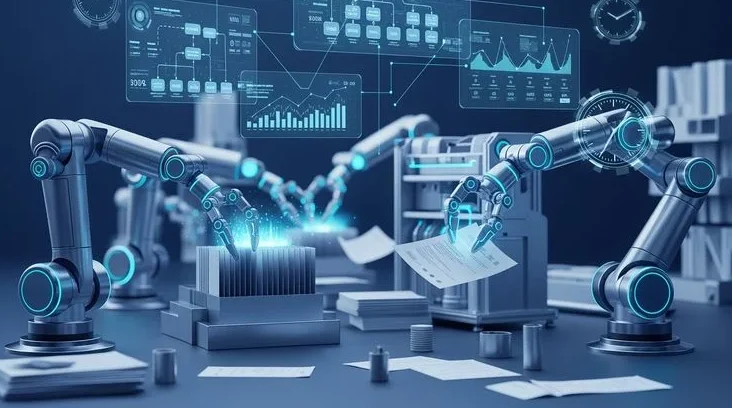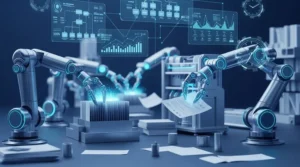AI business automation is revolutionizing the way companies handle daily tasks, optimize processes, and achieve greater efficiency. By merging artificial intelligence with automation, businesses can reduce costs, save valuable time, and make smarter decisions.
This technology does more than just eliminate repetitive workit also provides predictive insights, enhances accuracy, and improves customer experiences. In this guide, we will explore the benefits, challenges, use cases, and the future of AI business automation.
What Is AI Business Automation?
AI business automation refers to using artificial intelligence tools and algorithms to manage and streamline business processes that would otherwise require manual effort.
Unlike traditional automation, which simply follows programmed instructions, AI automation learns from data, adapts to patterns, and continuously improves outcomes. This combination makes it suitable for both simple workflows and complex decision-making.
Key Benefits of AI Business Automation
1. Increased Efficiency
AI-powered automation eliminates repetitive tasks like scheduling, reporting, and responding to routine inquiries. This frees up employees to focus on strategy, creativity, and innovation.
2. Cost Reduction
Businesses save money by reducing labor costs and avoiding errors. For example, automated invoice processing reduces mistakes that could lead to financial losses.
3. Improved Accuracy
AI systems deliver precise results, whether in accounting, data entry, or compliance checks. Unlike humans, AI doesn’t suffer from fatigue or oversight.
4. Enhanced Customer Experience
AI-driven personalization, chatbots, and recommendation systems create seamless customer interactions that build trust and satisfaction.
5. Scalability
Once implemented, AI tools can easily scale up with the business without requiring large investments in additional staff.
How AI Business Automation Works

AI automation is built on three main technologies:
-
Machine Learning (ML): AI analyzes historical data, recognizes patterns, and predicts outcomes.
-
Natural Language Processing (NLP): Enables AI systems to understand and respond to human language, powering chatbots and virtual assistants.
-
Robotic Process Automation (RPA): Executes structured tasks such as form processing, email responses, and data transfer.
Together, these technologies allow businesses to automate workflows end-to-end, reducing the need for human intervention.
Popular Use Cases of AI Business Automation
Customer Service Automation
AI-powered chatbots provide instant support, resolve complaints, and offer recommendations 24/7, improving customer satisfaction.
Marketing Automation
AI analyzes user behavior to send personalized emails, targeted ads, and relevant social media content, boosting conversions.
Finance and Accounting
Automation improves fraud detection, expense reporting, and compliance management, reducing risks for financial teams.
Human Resources
Recruitment becomes faster with AI that screens resumes, schedules interviews, and assesses candidate suitability.
Supply Chain Management
AI predicts demand, optimizes routes, and automates warehouse management, ensuring efficient operations.
IT and Cybersecurity
AI tools monitor networks, detect threats, and automate responses to cyber incidents, ensuring stronger security.
(For deeper insights, check this Forbes article on AI in business automation)
Why Businesses Need AI Automation Today

The business world is fast-paced, and therefore companies cannot afford to waste resources on repetitive work. In fact, AI automation offers the speed, precision, and adaptability needed to streamline processes and maintain efficiency. As a result, it ensures that businesses remain competitive, even in challenging markets. Moreover, employees can shift their focus from routine tasks to high-level decision-making, which ultimately drives innovation and long-term growth.
Challenges of AI Business Automation
-
High Initial Costs: Implementing AI tools may be expensive for smaller businesses.
-
Data Security: Since AI relies on data, ensuring its security is crucial.
-
Skill Gaps: Employees need training to operate and maintain AI systems.
-
Integration Issues: Connecting AI with legacy systems can be complex.
Despite these challenges, the long-term benefits make AI automation a worthwhile investment.
Best Practices for Implementing AI Business Automation
-
Start Small: Automate one process at a time to minimize risks.
-
Invest in Training: Upskill employees to manage AI systems effectively.
-
Prioritize Security: Protect sensitive business data with strong cybersecurity measures.
-
Measure ROI: Track performance to understand the return on investment from AI automation.
-
Choose Scalable Tools: Select solutions that can grow with your business.
Future of AI Business Automation
The future of AI business automation is bright, and as technology advances, several emerging trends are shaping industries more than ever before.
To begin with, hyper-automation will combine AI, RPA, and analytics to automate nearly every process, making business operations more seamless. In addition, predictive analytics will enable companies to anticipate market shifts and customer needs with greater accuracy, leading to smarter decisions.
Moreover, voice-driven automation will transform task management, as voice assistants take over scheduling, reporting, and routine communications. At the same time, autonomous operations will revolutionize supply chains and workflows, allowing them to function with minimal human involvement.
Finally, AI-powered decision-making will become a cornerstone of business strategy, as organizations increasingly rely on AI insights to plan, innovate, and grow.
FAQs About AI Business Automation
What industries benefit most from AI automation?
Industries like healthcare, finance, retail, logistics, and manufacturing see the largest impact.
Is AI business automation only for big companies?
No. Affordable AI tools make automation accessible to small and medium businesses too.
Does AI replace jobs completely?
AI replaces repetitive tasks, but humans remain essential for creativity, leadership, and innovation.
How secure is AI business automation?
AI is secure if implemented with strong data protection and compliance measures.
What is the first step to start with AI automation?
Businesses should identify repetitive tasks that consume the most time and explore AI tools to automate them.
Conclusion
AI automation is not just a trend; in fact, it is a necessity for businesses that want to stay competitive. By automating repetitive tasks, as a result, companies can reduce costs, improve decision-making, and empower teams to work smarter and grow faster.
Although challenges such as cost and training exist, nevertheless, the long-term benefits far outweigh these obstacles. Therefore, companies that embrace automation today will gain a lasting edge over competitors.
In conclusion, AI automation is reshaping industries by creating smarter, faster, and more efficient businesses.










